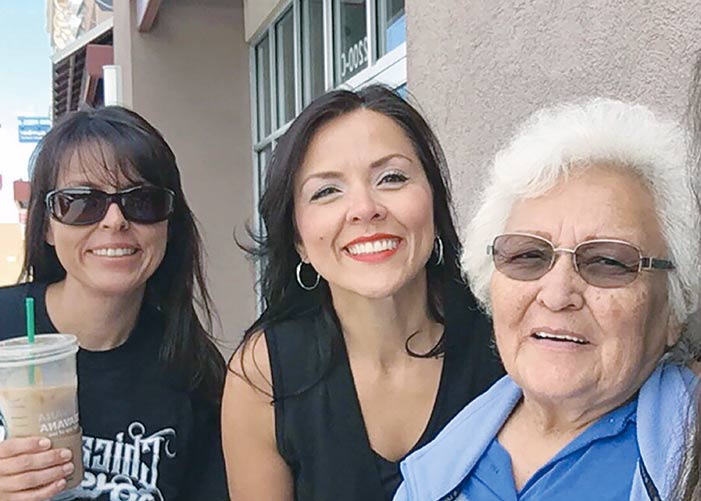
‘Spunky’ senior wrestles with COVID ‘monster’ and wins
By Erin Tapahe
Special to the Times
ELMHURST, Ill.
Evelyn Anderson was excited to travel to Chicago on March 4 to visit her two daughters. Little did she know this would be the start of the fight for her life.
“At the time it (COVID-19) wasn’t that big. I didn’t even know anything about it,” Anderson said. Anderson, 75, is Diné (Navajo) originally from Fort Defiance and currently residing in Gallup.
She is well known on the Navajo Nation as a spunky, energetic and outgoing person. Anderson spent over 50 years working for numerous businesses and organizations including the Bureau of Indian Affairs, P&M Coal Mine, Chevron Corp., Rehoboth McKinley Christian Hospital and the Rough Rock school district. Currently, she is not working and spending as much time as she can with family.
According to the Centers for Disease Control and Prevention, the COVID-19 virus has infected 957,875 people and killed 53,922 people in the United States as of April 26. COVID-19 is a worldwide pandemic and has infected many nations including the Navajo.
As a public service, the Navajo Times is making all coverage of the coronavirus pandemic fully available on its website. Please support the Times by subscribing.
How to protect yourself and others.
Why masks work. Which masks are best.
Resources for coronavirus assistance
Exposed on flight?

Courtesy photo
Evelyn Anderson, 75, right, poses with her daughters. Anderson contracted COVID-19 in Chicago and managed to defeat the virus.
Anderson was visiting her two daughters, Colene Hodge and Bernadette Wright, in Elmhurst, Illinois, a suburb of Chicago, when she became sick. Anderson believes she was exposed to the virus on her flight from Albuquerque to Chicago when a passenger behind her was coughing without covering his mouth. She asked the flight attendant if she could move to another seat, but the flight attendant said she could not because the seats were filled. “So I just had to sit there and that’s where I think I got the virus,” Anderson said.
Thirteen days after the flight on March 17, Anderson started vomiting, her body began swelling, and parts of her body started turning blue. Anderson did not suspect COVID-19 because she did not have typical symptoms, which are coughing, chest pain, breathing problems and fever, like she heard from the news on TV.
“I thought I could knock the ‘flu’ but it kept getting progressively worse,” Anderson said.
To urgent care
On March 27, Hodge drove her mother to the local urgent care facility. The doctors diagnosed Anderson with a urinary tract infection and dehydration. They gave her medicine and Anderson left feeling a bit better. Hodge and Wright were relieved their mother had the urinary tract infection because they assumed that meant Anderson did not have COVID-19. Wright stayed to comfort her mom.
Later that night Anderson developed smell sensitivity and began vomiting again throughout the night at home. “Whatever I smelt, I started upchucking,” Anderson said.
Anderson continued feeling worse. Hodge made an appointment for her mom on March 29 but the same urgent care location cancelled Anderson’s appointment because it was too close to closing time. Hodge planned to take her mother to a different medical facility. Hodge saw her mom quietly mouth “emergency room” and rushed her to the Elmhurst Hospital ER. “I knew she was really sick,” Hodge said.
The medical staff reacted very quickly and conducted a chest X-ray, CT scan, COVID-19 test and started Anderson on an IV for her dehydration. The doctor immediately suspected COVID-19 and entered the room completely covered in a pair of goggles, mask, gloves and a gown. The doctor told Anderson the fluid in her left lung was either pneumonia or COVID-19. The COVID-19 test results would not be available for 24 hours.
The doctor wanted to treat her as if she had COVID-19 as a safety measure.
Scary time
Hodge had to leave. “It was hard not knowing if I was going to see her again,” Hodge said.
After leaving the hospital, Hodge broke down in tears and was scared because she did not know the outcome of her mother’s case. The nursing staff monitored Anderson closely because of her swelling and her fingernails and lips were turning bluish.
Anderson also had a heart monitor placed around her neck. Anderson describes the heart monitor looking like “an old cellphone.” “They wanted to put a catheter on me, but I told them, ‘No, I’m very sick but I’ll walk,’” Anderson said. She is very self-sufficient and determined to do what she could on her own.
On March 30, the doctor officially announced Anderson positive for COVID-19. Hodge was scared she was not going to see her mom again. “I was not ready to lose my mom yet,” Hodge said. Wright received the news about her mom and she started crying.
Wright was worried about being exposed to the virus because she had had close contact with her mom when trying to comfort her when she was sick. Wright immediately texted her own doctor about her mom having the virus because Wright had cancer and was told by her doctors at the time she had a low immune system. Her doctor reassured Wright that she was not a high-risk patient because she had been cancer-free for three years. “I was very scared that I would be more susceptible,” Wright said. “I was cleared healthy, which made me happy but still scared I could get it.”
Supportive friends
Hodge forwarded the news to friends and family. Anderson’s friends were supportive and one told Hodge, “She’s strong and she’s going to get through this.” Many friends and family left supportive messages and prayed for Anderson’s health.
Anderson developed a headache and loss her sense of taste on the third day. She ate Jell-O and ice chips. Then she started experiencing trouble breathing. “It was really scary because I had never, ever been that sick before in my life and I didn’t think I was going to make it,” Anderson said. Anderson started eating food on the fourth day. She did not want to eat but repeatedly told herself, “You have to eat,” because she wanted to become stronger.
She started feeling better and walked around her room to strengthen her legs. The doctor came into Anderson’s room the fifth day and she recalls the doctor saying, “You’re looking good and I’m happy with the reports I’ve received from the nurses and I think you’re ready to be discharged.” Anderson spent six days in the hospital and was released on April 3. The medical staff instructed Anderson to do 10 days of “strict self-quarantine” and advised her to take it easy at home.
They gave her a mask and Anderson went to Hodge’s apartment. Anderson stayed at her daughter’s apartment alone and Hodge still continues to deliver meals every day to Anderson.
‘I will adjust’
“I will adjust anywhere, whether it’s Chicago or Gallup, I feel welcome and at home,” Anderson said. She tries to “take it easy” but still wakes up with the sun, cleans and stays occupied by assembling puzzles, texting friends and family, and playing games on her iPad.
Anderson started exercising on her third day at home. Hodge’s apartment is located on the third floor and Anderson decided to walk up and down the stairs for exercise. “I put my gear on and started walking those stairs,” Anderson said. She puts her shoes, gloves and mask on before exercising. “It’s 40 steps down and 40 steps up,” Anderson said.
She started walking down and up one time, waited three more hours to do it again and then again after another three hours. By the end of the day, she had walked the stairs three times. Anderson increased her stair walking routine to six sets a day and thought, “I can do better.”
She increased her routine to nine sets a day equaling 720 steps a day. Anderson had a telehealth appointment on April 13, 10 days after her discharge from the hospital. Anderson was asked questions about how she was feeling. She told the nurse about her exercises.
The nurse was surprised and instructed Anderson she needed to rest but if she really wanted could only do one set of stairs every other day.
Feeling better
Anderson is feeling better and continues to keep herself busy by watching TV, assembling puzzles, socializing virtually and walking stairs every other day. “Bored is not in my vocabulary. I keep myself happy,” Anderson said.
She expresses her deep gratitude to her family and friends who prayed for her health. She urges those around her to stay home because COVID-19 is a “monster and killer.”
Anderson has spent 25 days in self-quarantine and decided to quarantine an extra 15 days because she wanted to avoid being infected again.
Hodge explains she did not originally take COVID-19 seriously but seeing her mom sick provided her a new perspective and she wants the public to pay attention to the directions of their nation, state and city. She saw how sick her mom was with the virus and hopes no one will have to experience what her family went through. “I didn’t take it seriously,” said Hodge, “It took my mom getting sick for me to take it serious.”
Information: https://www.cdc.gov/coronavirus/2019-ncov/cases-updates/cases-in-us.html







 Highway 264,
Highway 264, I-40, WB @ Winslow
I-40, WB @ Winslow